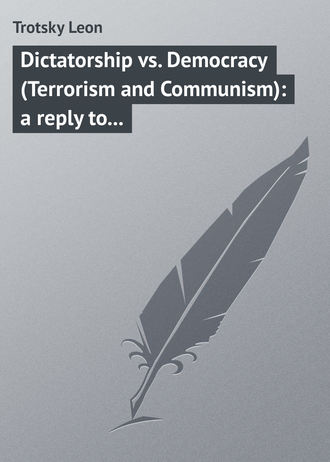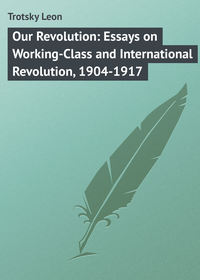 полная версия
полная версияDictatorship vs. Democracy (Terrorism and Communism): a reply to Karl Kantsky
That is why it seems to me that this book is still not out of date – to my great regret, if not as an author, at any rate as a Communist.
June 17, 1920.1
The arbitrament of arms is on; now the weapon of criticism must rest.
2
Translator's Note-For convenience sake, the references throughout have been altered to fall in the English translation of Kautsky's book. Mr. Kerridge's translation, however, has not been adhered to.
3
In order to charm us in favor of a Constituent Assembly Kautsky brings forward an argument based on the rate of exchange to the assistance of his argument, based on the categorical imperative. "Russia requires," he writes, "the help of foreign capital, but this help will not come to the Soviet Republic if the latter does not summon a Constituent Assembly, and does not give freedom of the Press; not because the capitalists are democratic idealists-to Tsarism they gave without any hesitation many milliards-but because they have no business faith in a revolutionary government." (Page 218.)
There are scraps of truth in this rubbish. The Stock Exchange did really support the government of Kolchak when it relied for support on the Constituent Assembly. From its experience of Kolchak the Stock Exchange became confirmed in its conviction that the mechanism of bourgeois democracy can be utilized in capitalist interests, and then thrown aside like a worn-out pair of puttees. It is quite possible that the Stock Exchange would again give a parliamentary loan on the guarantee of a Constituent Assembly, believing, on the basis of its former experience, that such a body would prove only an intermediate step to capitalist dictatorship. We do not propose to buy the "business faith" of the Stock Exchange at such a price, and decidedly prefer the "faith" which is aroused in the realist Stock Exchange by the weapon of the Red Army.
4
(The History of the American War, by Fletcher, Lieut. – Colonel in the Scots Guards, St. Petersburg, 1867, page 95.)
5
Fletcher's History of the American War, pages 162-164.
6
It is not without interest to observe that in the Communal elections of 1871 in Paris there participated 230,000 electors. At the Town elections of November, 1917, in Petrograd, in spite of the boycott of the election on the part of all parties except ourselves and the Left Social Revolutionaries, who had no influence in the capital, there participated 390,000 electors. In Paris, in 1871, the population numbered two millions. In Petrograd, in November, 1917, there were not more than two millions. It must be noticed that our electoral system was infinitely more democratic. The Central Committee of the National Guard carried out the elections on the basis of the electoral law of the empire.
7
Labor, Discipline, and Order will save the Socialist Soviet Republic (Moscow, 1918). Kautsky knows this pamphlet, as he quotes from it several times. This, however, does not prevent him passing over the passage quoted above, which makes clear the attitude of the Soviet Government to the intelligentsia.
8
The Vienna Arbeiterzeitung opposes, as is fitting, the wise Russian Communists to the foolish Austrians. "Did not Trotsky," the paper writes, "with a clear view and understanding of possibilities, sign the Brest-Litovsk peace of violence, notwithstanding that it served for the consolidation of German imperialism? The Brest Peace was just as harsh and shameful as is the Versailles Peace. But does this mean that Trotsky had to be rash enough to continue the war against Germany? Would not the fate of the Russian Revolution long ago have been sealed? Trotsky bowed before the unalterable necessity of signing the shameful treaty in anticipation of the German revolution." The honor of having foreseen all the consequences of the Brest Peace belongs to Lenin. But this, of course, alters nothing in the argument of the organ of the Viennese Kautskians.
9
Since that time this percentage has been considerably lowered (June, 1920).
10
This was the name given to the imperial police, whom the Minister for Home Affairs, Protopopoff, distributed at the end of February, 1917, over the roofs of houses and in the belfries.



